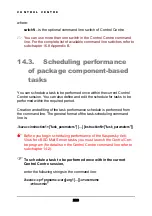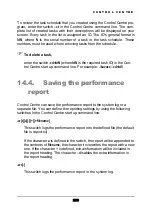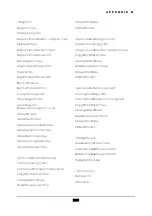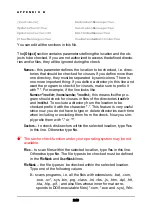
A P P E N D I X B
dows and OS/2 (.exe, *.dll), Linux (in the format elf); files with
the format of Microsoft Office documents and spreadsheets
(OLE2 and Access) and Java applets. Thereby, this value
scans all the files that are capable of carrying virus code.
1
– scans all the files with extensions: .bat, .bin, .cla, .cmd, .com,
.cpl, .dll, .doc, .dot, .dpl, .drv, .dwg, .eml, .exe, .fpm, .hlp, .hta,
.htm, .htt, .ini, .js, .jse, .lnk, .mbx, .md*, .msg, .msi, .ocx, .otm,
.ov*, .php, .pht, .pif, .plg, .pp*, .prg, .rtf, .scr, .shs, .sys, .tsp,
.vbe, .vbs, .vxd, .xl*.
2
– scans every file of every type (this value is equal to the mask
"
*.*
").
3
– scans file types defined by the user for the UserMask pa-
rameter. If you define more then one file type, they must be
separated by commas.
To make sure there is no virus in the location to be checked, it is
advisable to scan all the files.
UserMask
– the file masks to be checked for viruses (valid only if
File-
Mask=3
).
ExcludeFiles
– here you must define one of the values listed below:
0
– do not exclude any file or directory;
1
– do not check file types defined by the
ExcludeMask
parameter;
2
– do not check files located in directories defined by the
Exclud-
eDir
parameter;
3
– do not check file types defined by the
ExcludeMask
parameter
and files located in directories defined by the
ExcludeDir
pa-
rameter.
ExcludeMask
– here you may define file masks separated by commas
or spaces (this parameter is valid only if the value for
ExcludeFiles
is
1
or
3
).
ExcludeDir
– here you may define directories separated by commas
or spaces (this parameter is valid only if the value for
ExcludeFiles
is
2
or
3)
.
241
















































